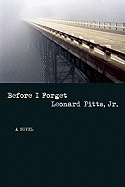

Five days after Mo learned that he was dying, Trey and two others rob a convenience store. It goes bad in so many ways: the owner is killed, and Trey drops his wallet at the scene. Shortly after that, Mo gets a call from his father's friend Cooley, who tells him his father, Jack, is dying of prostate cancer and wants to see his son. Mo refuses. It had been a lifetime since he'd seen his father, whom he blames for his mother's death. Mo has decided to kill himself. "Once he had been king of the mountain. Now he was a dying man writing a suicide note while waiting for his only child to be released from jail."
Mo posts bail for Trey and drives to Los Angeles to see his father, taking Trey with him. Jack was screwed up as a father, as was Mo, and now Trey, also a father, is the same. Mo thinks he might somehow be able to save his son. As his mind slips further away and he runs out of time, he thinks about wasted opportunities, the past he can't change and wonders if Trey will forgive him after he's gone. But he still has something to give his son when he says, "Be a better man than I was, Trey."
Leonard Pitts, Jr., has written a powerful novel about regrets, second chances, forgiveness and responsibility. Woven into Mo and Trey's lives are rich stories about people like Tash, Trey's mother, or the tragic Dog, torn between hope for his unborn daughter and a request from his mother and brother that could destroy him. Mo puts off mentioning his illness--one more layer in three generations of debilitating secrets--while he ponders the value of truth; was it "really worth this darkness now settling into Trey's eyes?" Mo's grief and anger, his struggles with his son and his father, combine with love in a crucible of hope and transformation. This is a beautiful, tragic and riveting work.--Marilyn Dahl
Shelf Talker: A compelling, moving novel about fathers and sons and what it means to be a man.

